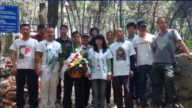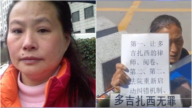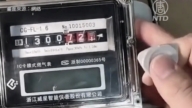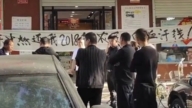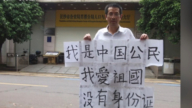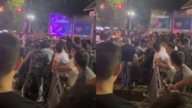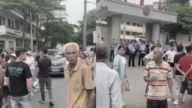【新唐人2013年03月28日訊】台灣「二二八66週年」,前民進黨主席蔡英文通過撰文的方式,把曾發生在台灣的這場悲劇的歷史真相,解釋給現階段中國大陸的年輕人聽,希望大陸民眾能真正理解台灣。針對蔡英文的這篇文章,一名80后的中國大陸的青年青年給蔡英文寫信,表達了他期盼民主的想法。這封信在網絡上發表之後,引起了廣泛的關注。請看本臺記者的報導。
署名「遊城鎮」的青年,日前給蔡英文寫了一封信,信中說:「我是一名大陸80後年輕人,看了你寫的一篇《二二八,寫給對岸的年輕人》文章後,一直想跟你說說我的想法。對於民進黨人,大陸大部分人,包括我身邊的很多人是這樣認為的,因為你們主張臺獨,所以你們是壞人。這也是我小時候的看法,這是在大陸官方長期愚民、單一、二元化結構教育下的真實反應。」
信中說:「在我的價值觀中,有比國家價值更高的價值,那就是人的價值。但是在中國五千年歷史當中,處處可以看見國家龐大的身軀壓過渺小的個體;國家長期、系統性的使用暴力,使得講真話、求真實、探索真理成為一種稀缺。 」
「遊城鎮」的這封信,在網路論壇刊登出來後,引起大陸網友的轉發和共鳴。
大陸民主人士恩廣表示,洗腦歷來是中共的主旋律,但現在是網絡時代,中共想再利用洗腦來欺騙中國百姓,已經是不可能的事情。而對於大陸上訪、維權和民主人士的打壓,中共一直沒有停止。
大陸民主人士恩廣: 「暴力其實對於專制來說它是一貫的,它沒有暴力就沒有它的強權。輸出暴力那是專制的本質,這基本上是一種共識。它之所以能穩定這麼多年,很大原因是對一些異己者的打壓、壓制。」
追溯「臺獨」的歷史,西元1927年,「第三共產國際」組織命令謝雪紅等人成立「台灣共產黨」,作為「日本共產黨」底下的一個支部。1928年,中共代管了「台灣共產黨」。同年4月,在上海霞飛路一家照相館樓上開會的當天,中共宣佈了三大主張,其中就有「台灣獨立」。
二次世界大戰結束,台灣脫離日本殖民,成了「中華民國」的一省,可是因為戰後的混亂,帶動貪污橫行、經濟蕭條,加上分隔五十年,造成的文化思想衝突,醞釀了「二二八」事件。
今年是「二二八事件66週年」,台灣方面在宜蘭舉行了中樞紀念儀式。蔡英文藉機撰文,文中寫道,「二二八事件」本質上是一件人民的抗議,遭遇國家暴力鎮壓的血腥慘案。但是在那恐怖期間,台灣人民並沒有灰心喪志,反對的力量從零星的對抗匯聚成一股團結的政黨,走過「二二八」,台灣今日有了民主自由。
北京時政觀察人士華頗: 「很欣喜的看到,自從台灣施行了民主憲政之後,對歷史有了一個充分的、公正的、公平的、公開的一個客觀的一個認識。包括馬英九代表國民黨對二二八的一個講話,也客觀的評價了二二八事件。」
北京時政觀察人士華頗還指出,和「二二八」相對應的,那就是20多年前發生在北京的「六四事件」。華頗說,現在,大陸人民和全世界都在呼籲中共公開「六四事件真相」。
華頗:「六四是中共繞不開的,它的結果當然會像台灣二二八一樣,得到一個公正、公平的評價。這個事件不會淹沒在歷史的漫漫長河之中,他的真相終會大白於天下。中國的民主憲政一定會到來的。」
蔡英文還說,相信有一天,民主的中國,也會用同樣慎重的心情來追思「六四」。台灣能,中國沒有理由不能。中國未來自由民主的重擔,就在大陸年輕人的肩膀上。
採訪編輯/唐睿 後製/蕭宇
Response to Tsai Ing-wen’s Letter by a Chinese Born in the 1980’s
On the eve of the 66th anniversary of Taiwan’s 228 Incident,
former Democratic Progressive Party Chairman, Tsai Ing-wen,
shared her thoughts regarding the 228 Incident
in an online article.
In the article, she expressed her hope for a better understanding
of Taiwan from the younger generations of China.
In response to Tsai Ing-wen’s letter, a Chinese born in the
1980’s wrote to Tsai to express his thoughts of democracy.
This online response sparked many discussions.
The following is our report.
An article addressed by a person using the pseudonym
‘Wanderer’stated, “I was born in the 1980’s.
Reading your 228 Incident, a letter to the young generation
across the Strait, I’d like to share with you my thoughts.
The majority of Chinese, including people around me,
believe that you, members of the Democratic Progressive
Party, are bad because of your pro-Taiwan independence.
This is also what I used to believe.
It is a true reflection and consequence of the mind-blocking
education system under the regime."
It stated: “To me, human value weighs more
than the nation’s value.
In the 5,000 years of Chinese history,
it is often that the nation outweighs the individual.
The long and systematic violence employed by a country
has turned speaking truth, finding truth, and being truthful into something rare."
This online posting from’Wanderer’immediately drew
discussion and attention from netizens.
Activist En Guang indicated that brainwashing has been
the main theme in the Communist regime’s ruling.
In the Internet era, brainwashing is being challenged
even though suppression of activists has never stopped.
Activist En Guang: “Violence exists in despotism.
The authoritarian relies on violence.
It is a consensus that violent output is the nature
of authoritarianism.
The authoritarian suppresses dissidents to maintain
its ruling."
The ‘Taiwan independence movement’can be traced back
to 1927 when the Third Communist International commanded
Hsieh Hsueh-hung to organize the Taiwan Communist Party
as a branch under the Communist Party of Japan.
In 1928, the Chinese Communist Party (CCP) escrowed
the Taiwan Communist Party.
In April 1928, the CCP announced three propositions,
including ‘Taiwan independence,’during a meeting held upstairs of a studio in Shanghai.
Following the end of World War II, Taiwan was free from
Japanese colony and became a province of the Republic of China.
However, the 228 Incident occurred as a result of post-war
chaos such as rampant corruption, economic depression,
and the cultural and ideological conflict of over 50 years
of separation from China under Japanese ruling.
This year marked the 66 anniversary of the 228 Incident.
Taiwan held a central memorial in Ilan.
Tsai Ing-wen took the opportunity to explain that the 228
Incident was a protest, but met with violent crackdown and became a bloody tragedy.
During the horrifying period, people were not discouraged.
The opposition political parties united.
Suffering through the 228 Incident, Taiwan developed
the democracy and freedom.
Current affairs observer, Hua Po: “I am very pleased
to see that with a constitution, Taiwan has a full, impartial, fair, open and objective recognition of the history.
I believe President Ma Ying-jeou’s speech on behalf
of the Kuomintang also delivered an objective evaluation of the 228 Incident."
Hua Po also compared the 228 Incident
to the June 4 massacre in Beijing more than 20 years ago.
He said, people are asking the Communist regime
to face the truth of the June 4 massacre.
Hua Po: “The Communist regime cannot avoid
the June 4 massacre.
A fair and just evaluation is a must
just like Taiwan’s 228 Incident.
This history will not be forgotten.
The truth will be revealed.
Constitutional democracy will surely come in China."
Tsai Ing-wen also stated that she believes democracy
will bring a solemn memorial of the June 4 massacre in China.
If Taiwan can, so can China.
China’s freedom and democracy lay on the shoulders
of the young Chinese.



